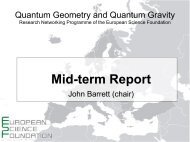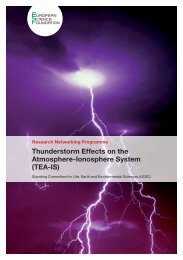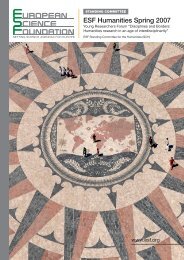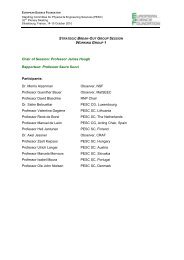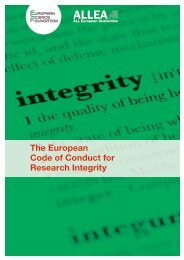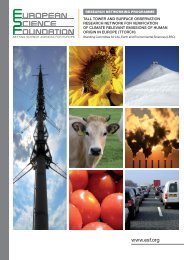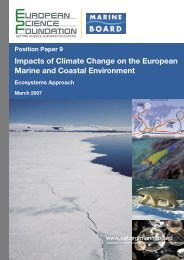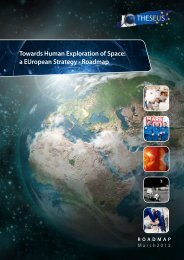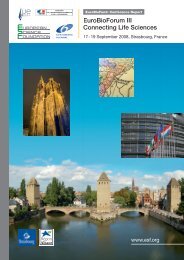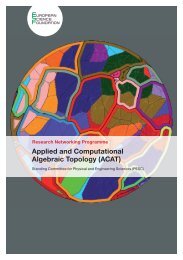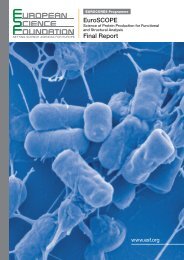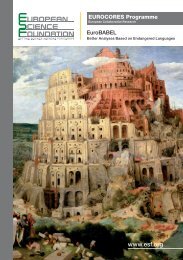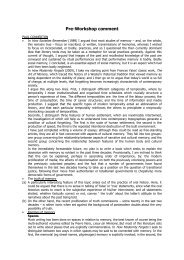Synthesis Report - European Science Foundation
Synthesis Report - European Science Foundation
Synthesis Report - European Science Foundation
Create successful ePaper yourself
Turn your PDF publications into a flip-book with our unique Google optimized e-Paper software.
References56Responses to Environmental and Societal Challenges for our Unstable Earth (RESCUE)Jäger, J. (2009). Sustainability <strong>Science</strong> in Europe. Papercommissioned by EC DG Research. ec.europa.eu/ research/sd/pdf/workshop-2009/background_paper_sust_science_workshop_october_2009.pdfJasanoff, S. (2003). Technologies of humility: Citizenparticipation in governing science. Minerva 41, 223-244.Jones, P., Selby, D. and Sterling, S. (eds) (2010).Sustainability Education - Perspectives and Practice acrossHigher Education. Earthscan. 384p. ISBN 1-84407-878-7.Jörg, T., Davis, B. and Nickmans, G. (2007).Towards a new, complexity science of learning andeducation. Educational Research Review 2(2), 145-156.Kegan, R. and Lahey, L.L. (2009). Immunity to Change:How to Overcome it and Unlock the Potential in Yourself andyour Organization. Boston: Harvard Business Press.Klein, J.T. (1996). Crossing boundaries: knowledge,disciplinarities, and interdisciplinarities. Charlottesville,Virginia, USA: University Press of Virginia.Klein, J.T. (2010). Creating Interdisciplinary CampusCultures: A Model for Strength and Sustainability. Jossey-Bass. An imprint of Wiley. 240p. ISBN 978-0-470-55089-2.KLSC (2011). Draft <strong>Science</strong> Plan of the “Knowledge,Learning, and Societal Change” (KLSC) project, IHDP<strong>Report</strong>. 67p. proclimweb.scnat.ch/portal/ressources/1737.pdfKoetz, T., Farrell, K.N. and Bridgewater, P. (2011).Building better science-policy interfaces for internationalenvironmental governance: assessing potential within theIntergovernmental Platform for Biodiversity and EcosystemServices. International Environmental Agreements.DOI 10.1007/s10784-011-9152-zKrasny, M.E., Lundholm, C. and Plummer, R. (eds) (2011).Resilience in Social-Ecological Systems - The Role of Learningand Education. Routledge. 224 p. ISBN 978-0-415-55253-0Krott, M. (2004). Evaluation of transdisciplinary research,in Unity of Knowledge (in Transdisciplinary Research forSustainability). In: Encyclopedia of Life Support Systems(EOLSS), G.H. Hadorn (ed.). Oxford: Eolss Publishers.Leemans, R. et al. (2009). Developing a common strategy forintegrative global change research and outreach: the EarthSystem <strong>Science</strong> Partnership (ESSP). Current Opinion inEnvironmental Sustainability 1, 4-13.Lemos, M.C. and Morehouse, B.J. (2005). The co-productionof science and policy in integrated assessments. GlobalEnvironmental Change 15, 57-68.Léna, P. (2009). Editorial: Europe Rethinks Education.<strong>Science</strong> 326, 501.Lenton, T.M. et al. (2008). Tipping elements in the Earth’sclimate system. Proceedings of the National Academy of<strong>Science</strong>s 105(6), 1786–1793.Lloyd, G.E.R. (2009). Disciplines in the Making: Cross-Cultural Perspectives on Elites, Learning, and Innovation.Oxford University Press.Lövbrand, E., Stripple, J. and Wiman, B. (2009). EarthSystem governmentality: Reflections on science in theAnthropocene. Global Environmental Change 19(1), 7-13.Lyall, C. (ed.) (2011). Interdisciplinary Research: A Seriesof Short Guides. The Institute for the Study of <strong>Science</strong>,Technology and Innovation (ISSTI),www.genomicsnetwork.ac.uk/innogen/publications/innogenpolicybriefs/title,22380,en.htmlMeadows, D.H., Meadows, D.L., Randers, J. and BehrensIII, W.W. (1972). Limits to Growth: A <strong>Report</strong> for the Club ofRome’s Project on the Predicament of Mankind. 205p.ISBN 0-87663-165-0. www.clubofrome.org/?p=326Meadows, D.H, Meadows, D.L. and Randers, J. (1992).Beyond the Limits: Confronting Global Collapse, Envisioninga Sustainable Future. Earthscan. 320p. ISBN 1-85383-130-1.Meadows, D.H., Randers, J. and Meadows, D.L. (2004).Limits to Growth - The 30 year Update. Earthscan. 362p.Miller, T.R., Muñoz-Erickson, T. and Redman, C.L. (2011).Transforming knowledge for sustainability: towardsadaptive academic institutions. International Journal ofSustainability in Higher Education 12(2), 177-192.Moll, P. and Zander, U. (2006). Managing the Interface,From knowledge to action in global change and sustainabilityscience. Munich: oekom Verlag.Moore, B., Underdal, A., Lemke, P. and Loreau, M.(2001). The Amsterdam Declaration on Global Change.In: Challenges of a changing earth: Proceedings of theGlobal Change Open <strong>Science</strong> Conference, Amsterdam, TheNetherlands, 10–13 July 2001, W. Steffen, J. Jäger, D. Carsonand C. Bradshaw (eds). Berlin: Springer-Verlag, p.207–208.Moss, S., Pahl-Wostl, C. and Downing, T. (2001). Agentbasedintegrated assessment modelling: the example ofclimate change. Integrated Assessment 2, 17-30.Norberg, J. and Cumming, G. (eds) (2008). Complexitytheory for a sustainable future. Columbia University Press.312p. ISBN 978-0-231-13461-3.Nowotny, H., Scott, P. and Gibbons, M. (2001). Rethinking<strong>Science</strong>: Knowledge and the Public in an Age of Uncertainty.Cambridge: Polity Press.O’Brien, K. and Wolf, J. (2010). A Values-based Approachto Vulnerability and Adaptation to Climate Change. WileyInterdisciplinary Reviews: Climate Change 1, 232-242.



